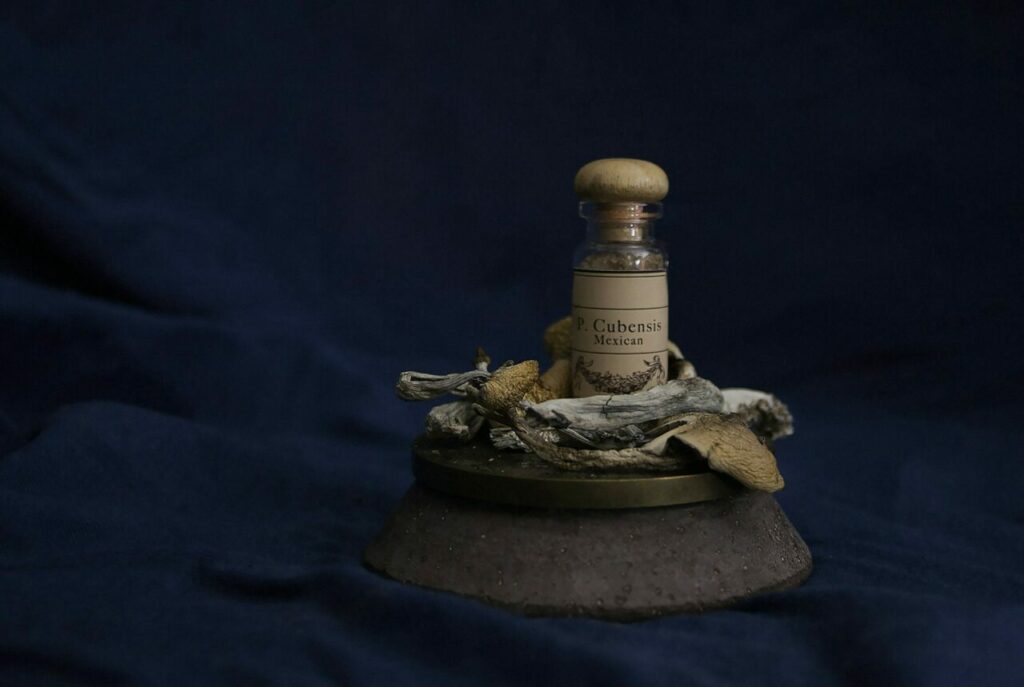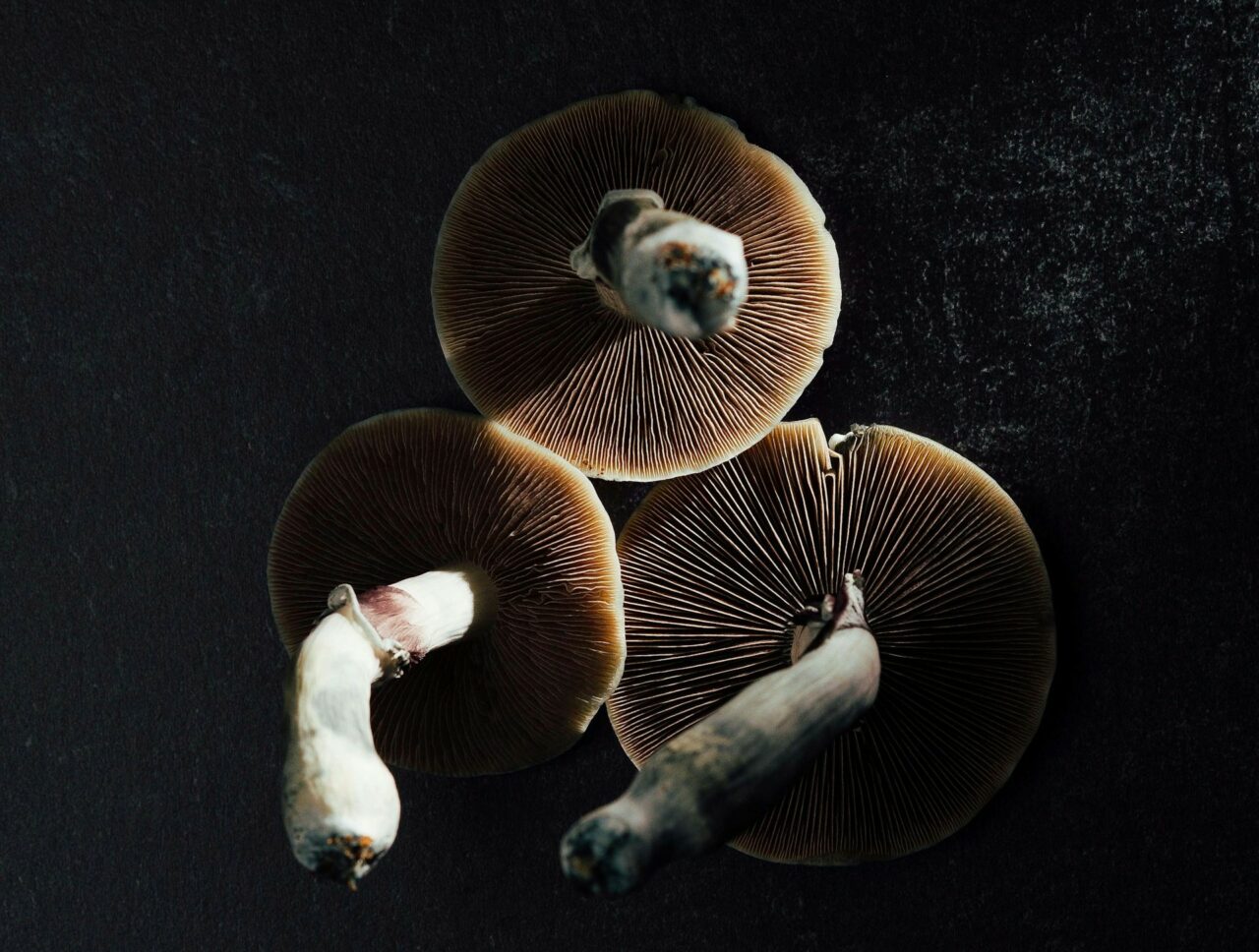As the interest in natural magic mushrooms in Canada continues to surge, there is a parallel increase in the demand for lab-created psilocybin products. These products are favored by many researchers due to their standardized dosage. However, it’s important to note that natural mushrooms can have a higher potency compared to their synthetic equivalents. Experts have pointed out significant variances between the two, including differences in strength.

Key Takeaways:
- Over 180 species of natural mushrooms provide varying levels of potency. Factors such as species, consumption method, cultivation, and individual tolerance can influence the effects.
- Laboratory-created psilocybin, a synthetic form of the natural compound, is produced in regulated environments to guarantee consistency and purity. This is particularly crucial for clinical research, especially in mental health treatments.
- The combination of different compounds in psychedelic mushrooms, including psilocin and baeocystin, can lead to a deeper and more intense experience than a single compound alone.
The Growing Market: Psychedelics in Different Forms
The demand for psilocybin mushrooms in Canada is on the rise, particularly for the treatment of specific mental health problems like OCD, depression, PTSD, and anxiety. In light of this growing interest, provincial governments have started to contemplate the decriminalization of its recreational use.
In 2020, Canada authorized limited medical use of these mushrooms under certain circumstances. More recently, in the previous year, the federal government granted approval for specific terminally ill patients to utilize these substances for symptom management.
These forward-thinking developments have paved the way for the advent of synthetic psychedelics.
The Ongoing Debate
The continuous discourse around organic versus synthesized psychedelics revolves around safety, accessibility, and cost considerations.
Many contend that natural psychedelics offer a more comprehensive and traditional experience. Conversely, supporters of lab-produced versions emphasize their advantage in standardization for medical application, along with guaranteed dosage control and quality assurance.
Although synthetic psychoactive substances could widen their reach, there are ongoing concerns about potential monopolization of the drug market. Critics worry that this could result in less increased costs for users.
/wp:paragraph –>A Closer Look at Psilocybin: A Comprehensive Overview
Psilocybe cubensis, a variant of magic mushroom, belongs to the plethora of naturally existing psychedelic substances present today. These magic mushrooms, recognized for their mind-altering effects, come in a variety of strains including Golden Teachers, Amazonian Cubensis, Blue Meanies, and more, with Psilocybe cubensis being the most widely-known family.
Decoding the Psychedelic Process
Psilocin, a compound derived from this mushroom, undergoes a transformation into a different chemical when metabolised by the liver. This newly formed compound engages with the brain’s serotonin receptors, specifically the 5-HT2A receptor.
This receptor is integral to mood regulation, cognitive functions, and perception. Its interaction with the transformed compound alters the regular functioning of serotonin pathways, leading to modified visual and auditory perception, shifts in thought processes, and emotional states. This interaction culminates in an elevated mood, enhanced creativity, introspection, and the so-called “psychedelic” experiences.
The Two Major Categories
| Natural | Found in over 180 species of fungi, the potency varies depending on the mushroom type. Psilocybe cubensis is a well-known variety. The effects can diverge based on intake methods, cultivation techniques, and individual tolerance. |
| Synthetic | Manufactured in labs and chemically identical to natural compounds. They are produced in controlled settings to maintain consistency and purity. These are increasingly being researched for their potential clinical uses, particularly in mental health treatments. |
Natural Gift vs. Scientific Innovation: The Fundamental Differences
Natural variants of these drugs can be found in certain species of magic mushrooms. These mushrooms have been utilized in the rituals and ceremonies of Indigenous communities in North and South America, who regard them as sacred or divine.
- Derived from plants and mushrooms
- Utilized in ancient rituals and healing practices
- The unique genetic composition of each strain contributes to its potency
On the flip side, the
Synthetic drugs are These substances are conceived to closely mimic the natural chemical structure of particular compounds. Expertly constructed by trained professionals within controlled settings, they aim for the utmost precision. Although these substances function in a similar fashion to natural drugs, they can alter the overall psychedelic experience.
- Devised by proficient pharmaceutical experts
- Recent breakthroughs aimed at medical use
- Clearly established potency due to the regulated production process
Organic materials provide more advantages due to their bioactive elements. Various types of mushrooms can hold different amounts of psilocybin and other compounds, which results in a range of effects.
Researcher Insights
Research by the Hebrew University has shown that psychedelic mushrooms have a more potent and long-lasting influence on synaptic plasticity than their synthetic counterparts. The researchers studied the drug’s effect on the brain activity of mice by observing behavioural changes and specific brain chemicals.
The research discovered that the extract reduced head twitches and promoted the formation of new brain connections. This suggests that mushroom extract may offer more benefits than a single compound.
The research team also proposed the idea of the “entourage effect”. This was defined as the occurrence where the combined effects of multiple compounds in psychedelic mushrooms could be more potent than the effects of individual compounds. In relation to mushrooms, psilocin, baeocystin, and other tryptamines might synergistically produce a profound experience.
These additional chemicals are absent in laboratory-produced substances, which might result in nuanced differences in effects, even if the psychedelic content is the same.
Expert Opinions on Nature’s Superiority
Studies consistently suggest that psilocybin, regardless of its form, shows promising results in treating various psychiatric disorders. A study carried out in 2024 explored the effects of controlled substances on patients with treatment-resistant depression. It found a reduction in symptoms following the administration of magic mushrooms.
When combined with other treatments, organic psychedelics might stimulate deeper emotional processing and insights during therapy sessions, thereby enhancing long-term results.
Scientists from the same university noted that hallucinogenic mushrooms boost synaptic plasticity. They possess a distinctive metabolic profile that impacts oxidative stress and energy production pathways, unlike synthetically-created psychedelics.
Implications on the Market
The growing body of research on this subject could shift Canadians’ perspectives and buying behaviors towards psychedelics. Early efforts by Health Canada, such as the Special Access Program, are demonstrating encouraging progress in laying the groundwork for legalization and revolutionizing the therapeutic landscape. Psilocybin-assisted therapy has the potential to become a forefront treatment method in the near future.
As the country progresses towards fully harnessing the power of organic psychedelics, organic options are predicted to become increasingly vital in clinical trials and therapeutic settings. This move could trigger substantial breakthroughs in mental health remedies.
How to Safely Acquire Shrooms in Canada
- Via Section 56 Exemption: Health Canada recognizes the potential of psilocybin as an alternative treatment for patients dealing with severe medical conditions. This exemption is part of the Controlled Drugs and Substances Act.
- Clinical Trials: Initial clinical trials have been authorized to investigate the drug’s efficacy in treating mental health conditions. Participants must meet specific requirements and undergo a physician’s evaluation.
- Online Market: Psilocybin capsules or edibles can be purchased from online sellers in Canada. However, it’s crucial to ensure that you are buying from a reliable source.
Unveil the Power of Natural Substances
Nature abounds with marvels, including shrooms. Instead of turning to synthetic psychedelics, consider the naturally potent magic mushrooms from Canada. They offer therapeutic benefits. Explore the best naturally acquired shroom strains at Magic Mushies Canada.
The shrooms we have available exceed industry standards by maintaining their purest and most genuine composition in a dried state. Place your order now for a convenient and discreet delivery of your chosen items to your doorstep.
Frequently Asked Questions
What are baeocystin and norbaeocystin?
Both are tryptamine or indole alkaloids. They bear a chemical resemblance to psilocybin. These tryptamine derivatives act as secondary alkaloids in shrooms, contributing to the overall psychedelic experience, though to a lesser extent. Baeocystin and Norbaeocystin share similar chemical structures but
Psychoactive properties can vary between substances.
Are organic dried mushrooms found in capsules and edibles?
The nature of the experience can be influenced by the product source. Online dispensaries offer products that are abundant in organic elements, facilitating a comprehensive entourage effect. Clinical trials and clinics, on the other hand, often utilize synthetic compounds in a capsule form.
Do natural psychedelics induce deeper experiences?
It’s worth noting that expecting an intense experience from a natural psychedelic could potentially bring about that exact result. Our expectations, a component of the ‘set’, can guide the experience. Natural psychedelics are frequently linked with ceremonial traditions, and this ritualistic environment can lead to uniquely fulfilling experiences. These experiences significantly differ from those of clinic sessions, which involve synthetic compounds.





